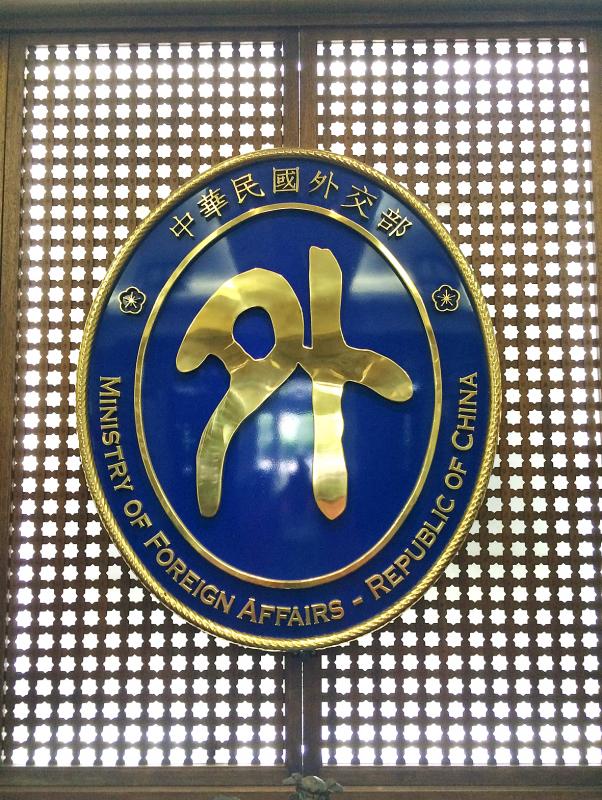Taiwan would strive to join the Comprehensive and Progressive Agreement for Trans-Pacific Partnership (CPTPP), as it would be challenging for the nation to join the Regional Comprehensive Economic Partnership (RCEP) given China’s dominance in the latter, the Ministry of Foreign Affairs said yesterday.
The RCEP was signed by 15 Asia-Pacific nations on the last day of the virtual ASEAN summit yesterday, becoming the world’s largest free-trade agreement.
The 15 nations are the 10 ASEAN members — Brunei, Cambodia, Indonesia, Laos, Malaysia, Myanmar, the Philippines, Singapore, Thailand and Vietnam — and Australia, China, Japan, New Zealand and South Korea.

Photo: Lu Yi-hsuen, Taipei Times
Taiwan would find it substantially difficult to join the RCEP, as it is led by China, the ministry said, adding that, as such, Taiwan’s main goal regarding regional economic integration is to push for participation in the CPTPP.
Taiwan would strive to initiate informal consultations, in preparation for joining the CPTPP, the ministry said, adding that it would continue to seek economic and trade cooperation opportunities with New Southbound Policy partner nations, the US, Japan and other like-minded nations.
Taiwan would make good use of the “US-Taiwan Framework to Strengthen Infrastructure Finance and Market Building Cooperation,” the ministry said, adding that the government would also support adding value to products and industrial transformation.
Separately yesterday, the Chinese Nationalist Party (KMT) accused the Democratic Progressive Party (DPP) government of not proactively trying to join the RCEP over the past four years, and declaring failure without even trying.
The trade volume between Taiwan and RCEP members accounts for about 59 percent of the nation’s total trade volume, and Taiwan’s investment in those nations accounts for 65 percent of its total foreign investment, so if Taipei cannot join the trade pact, the nation would suffer, the KMT said.
The DPP, trying only to please the US in the hopes of furthering economic and trade cooperation with Washington, neglected the development of the RCEP and the CPTPP, the KMT said, adding that the DPP’s failure in this regard could result in Taiwan being marginalized economically.
The party urged President Tsai Ing-wen (蔡英文) to call a high-level, cross-ministerial meeting to discuss how the RCEP would affect Taiwan and draw up solutions, saying that a report should be presented to the Legislative Yuan so that the public is not kept in the dark.

BUILDUP: US General Dan Caine said Chinese military maneuvers are not routine exercises, but instead are ‘rehearsals for a forced unification’ with Taiwan China poses an increasingly aggressive threat to the US and deterring Beijing is the Pentagon’s top regional priority amid its rapid military buildup and invasion drills near Taiwan, US Secretary of Defense Pete Hegseth said on Tuesday. “Our pacing threat is communist China,” Hegseth told the US House of Representatives Appropriations Subcommittee on Defense during an oversight hearing with US General Dan Caine, chairman of the Joint Chiefs of Staff. “Beijing is preparing for war in the Indo-Pacific as part of its broader strategy to dominate that region and then the world,” Hegseth said, adding that if it succeeds, it could derail

CHIP WAR: The new restrictions are expected to cut off China’s access to Taiwan’s technologies, materials and equipment essential to building AI semiconductors Taiwan has blacklisted Huawei Technologies Co (華為) and Semiconductor Manufacturing International Corp (SMIC, 中芯), dealing another major blow to the two companies spearheading China’s efforts to develop cutting-edge artificial intelligence (AI) chip technologies. The Ministry of Economic Affairs’ International Trade Administration has included Huawei, SMIC and several of their subsidiaries in an update of its so-called strategic high-tech commodities entity list, the latest version on its Web site showed on Saturday. It did not publicly announce the change. Other entities on the list include organizations such as the Taliban and al-Qaeda, as well as companies in China, Iran and elsewhere. Local companies need

CRITICISM: It is generally accepted that the Straits Forum is a CCP ‘united front’ platform, and anyone attending should maintain Taiwan’s dignity, the council said The Mainland Affairs Council (MAC) yesterday said it deeply regrets that former president Ma Ying-jeou (馬英九) echoed the Chinese Communist Party’s (CCP) “one China” principle and “united front” tactics by telling the Straits Forum that Taiwanese yearn for both sides of the Taiwan Strait to move toward “peace” and “integration.” The 17th annual Straits Forum yesterday opened in Xiamen, China, and while the Chinese Nationalist Party’s (KMT) local government heads were absent for the first time in 17 years, Ma attended the forum as “former KMT chairperson” and met with Chinese People’s Political Consultative Conference Chairman Wang Huning (王滬寧). Wang

CROSS-STRAIT: The MAC said it barred the Chinese officials from attending an event, because they failed to provide guarantees that Taiwan would be treated with respect The Mainland Affairs Council (MAC) on Friday night defended its decision to bar Chinese officials and tourism representatives from attending a tourism event in Taipei next month, citing the unsafe conditions for Taiwanese in China. The Taipei International Summer Travel Expo, organized by the Taiwan Tourism Exchange Association, is to run from July 18 to 21. China’s Taiwan Affairs Office spokeswoman Zhu Fenglian (朱鳳蓮) on Friday said that representatives from China’s travel industry were excluded from the expo. The Democratic Progressive Party government is obstructing cross-strait tourism exchange in a vain attempt to ignore the mainstream support for peaceful development